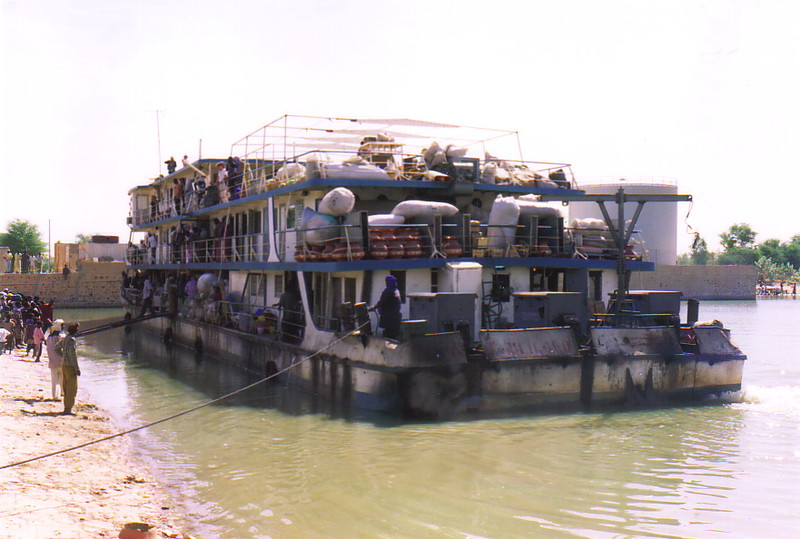
Now that I'm on the public ferry from Timbuktu to Gao, I finally understand why the guidebooks rave about the River Niger boat trip. I spent most of the pinasse trip from Mopti to Timbuktu shifting my weight from one corrugated cheek to another while trying not to inhale high tar cigarette smoke from my neighbour's Liberté, and although the view out of the side of the boat was pleasant, it wasn't that exciting; on the ferry, though, it's a completely different experience.
The difference is mainly one of luxury, though I use the term 'luxury' in an extremely loose way. I've had enough of sleeping on corrugated decks, so I splashed out on a bed in the third class cabin, which cost me marginally more than the pinasse, but which enables me to take a bunk in one of the 11-bed cabins on the lower deck. Brook, younger and obviously made of sterner stuff, has made me feel rather wimpish by opting for a fourth class ticket – deck class – which comes in at under a third of the price of the Mopti-Timbuktu pinasse, but which gives him space on the pleasantly flat top deck, without a corrugation in sight. For both of us this signals an increase in luxury level that we're treating like Christmas; this trip is going to be fun.

Operated by the Compagnie Malienne de Navigation (CMN), the public ferry Tomboctou wouldn't win any prizes in the West – judging by the signs in German dotted round the place, it's from ex-European stock like the Bamako-Mopti buses – and some aspects, like the toilets, are best left unexplored, but the advantages over our pinasse are manifold. Starting from the top, there's a large, flat roof which you can reach via a ladder, and which provides a far more stable sunset viewing platform than the pinasse's shaky roof; the top deck is open, airy and uncrowded, containing the first class and luxury cabins, as well as a bar that sells cold beers, soft drinks and water, none of which were available on our pinasse; the second deck contains the second class cabins, which only have four bunk beds in each room, and the second class toilets; and the bottom deck is home to the engines, the cheap toilets, the showers, the third class dorms, lots of rice sacks, families sleeping on reed mats, ambling goats and chickens, and a few dark, satanic rooms that I'm worried might be the kitchens. After the chicken-coop effect of the pinasse the CMN ferry feels like a floating hotel, albeit one with a distinctively African character.
Easy Does It
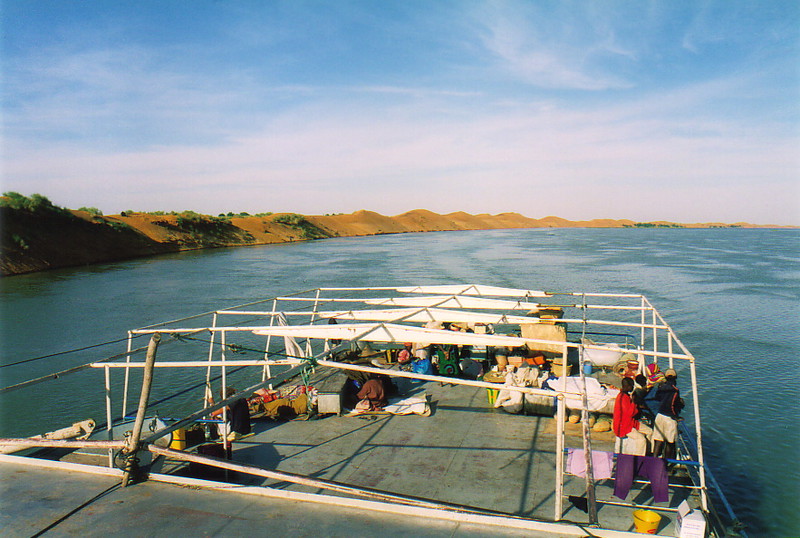
Things have gone smoothly from the very start, which I really wasn't expecting. We were told the ferry would be arriving in the old Timbuktu port of Kabala at 11am, and after just five minutes by the side of the southbound exit road from Timbuktu, we found a couple of donkey carts who were only too happy to take us to the grand bateau in time for the arrival. People waved and grinned us as we bumped along the 7km road to the port, and when we arrived I found the ticket office, asked for tickets, and managed to buy them without any arguments over the price, any discussions as to when – or whether – the boat would be leaving, or any hassle whatsoever. The ticket man was formally polite, and as I handed over the money I heard the ferry toot its horn and saw it glide into view, bang on time. I wasn't expecting this kind of efficiency; indeed, the only thing that went remotely wrong with the whole process was the name on my ticket, 'Mark Moxxon', which I rather like because it makes me sound like a character from a science fiction B-movie.

I'm just not used to the luxury of a bed, a lockable cabin or proper toilets (though, to be fair, a hole into the river is preferable to proper toilets, as holes tend not to smell quite so bad). The ferry's height over the river makes quite a difference too. On the pinasse we were only a few feet above the water, so we couldn't see very far beyond the shoreline, especially as Mali is so flat; on the ferry, though, the top deck is about 7m above the river and the roof is even higher, so the view from my pleasantly comfortable plastic chair is stunning. This is what I missed on the pinasse when burying my aching and bored mind into Kurt Vonnegut, and although the ferry might not be such a uniquely Malian mode of transport, I vastly prefer it.
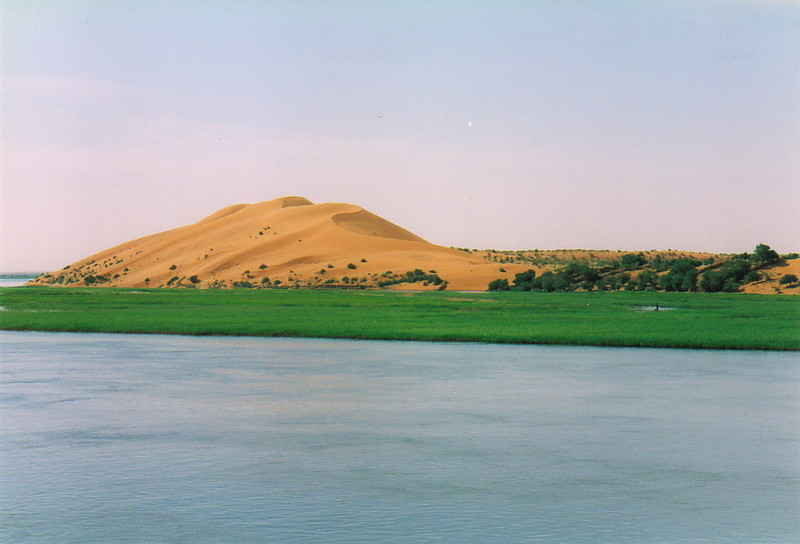
On the other hand, Mali is never very far away. On the first night of this three-day, two-night trip, I was relaxing on the top deck, watching the landscape float by, and a grinning little kid plonked himself right next to me, pulled out a pocket radio and an amplifier the size of a practice guitar amp, and started thumbing his way through the airwaves until he found the most annoyingly jabbering programme available; he turned this up to full volume, distorting the voices to hell, and smiling at me he promptly disappeared downstairs, leaving me to watch the sunset with his radio blaring white noise into my right ear. Luckily he came back before I managed to work out the best angle for kicking the whole caboodle into the river without making it too obvious that it was me, but it made the point that even on a beautiful river cruise, Africa is just on the doorstep.
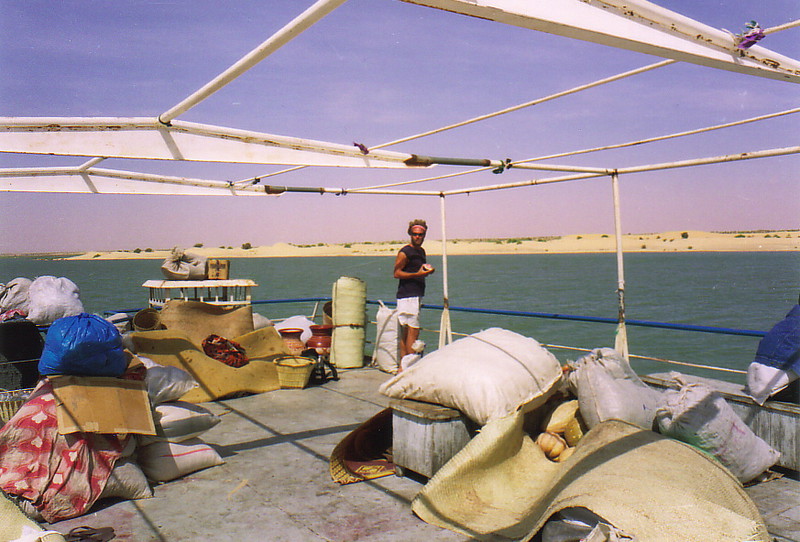
The bar has an equally cavalier attitude to music, blaring out a raucous mix of hip-hop and Malian blues at such a bass-thumping volume that it makes the windows rattle in their cracked putty. I can't work out who this is aimed at; the toubabs on board aren't remotely interested in listening to music at such a belligerent volume, the locals seem to snooze on deck regardless of whether anything is playing, and it clears the bar quicker than the effects of real ale and curried baked beans, but it's just possible that it's for the benefit of the locals out there in the fields. They certainly wave a lot as we boom past.
There's a surprisingly large number of people along the River Niger, despite the harshness of the landscape. At a number of places on the way to Gao the desert comes right up to the river, and you're presented with the beautiful sight of yellow Saharan dunes lapping against the light green Niger, while the hot sun beats down from a cloudless blue sky.
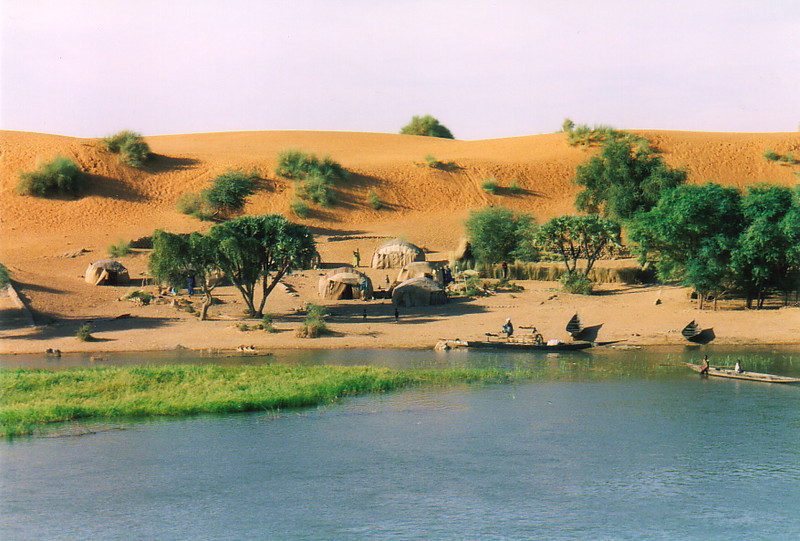
Most of the time, though, there's a fertile strip alongside the river, supporting bright green fields of what looks like rice or millet, with locals dotted throughout the fields, their conical hats looking positively Asian at times. Fishing pirogues ply up and down the river banks, a surprisingly large number of them punted along by young boys, and every now and then you pass isolated villages consisting of three or four mud buildings, surrounded by children yelping and screaming along with the ferry's hip-hop. It's a mishmash of greens, yellows, blues and browns that's beautifully relaxing to watch rolling by, and as the ferry approaches Gao, the bright green fields to the north of the river contrast with the deep red dunes to the south in a colour scheme that's uncannily reminiscent of the Australian outback.

I adore it, especially when the music stops vibrating my bone marrow. It might not be a luxury cruise, but compared to the pinasse it feels like the QE II, and sitting on the roof, supping a chilled Castel beer while the sun sinks into the red-green landscape, is heaven. On the pinasse I noticed that whenever the crew hopped onto the roof to pray to Allah, the whole boat would tip to one side, the pinasse joining in with a respectful nod to the creator of the universe. On the ferry the crew repeat a similar performance every night at sundown, ten of them standing and kneeling in unison in the direction of Mecca, and we sit on the roof with them, sipping beer in the manner of infidels while the ferry remains as steady as a rock. This boat is a different beast altogether; it even behaves itself at prayer time.
And despite this more normal mode of transport, I've at last found that feeling of being somewhere exotic; I feel as if I'm travelling, and this is the first time I've felt that in seven weeks of exploring West Africa. As the stars rotate round the clear night sky above the River Niger, I finally feel as if I've arrived in Africa. It's about bloody time, too.